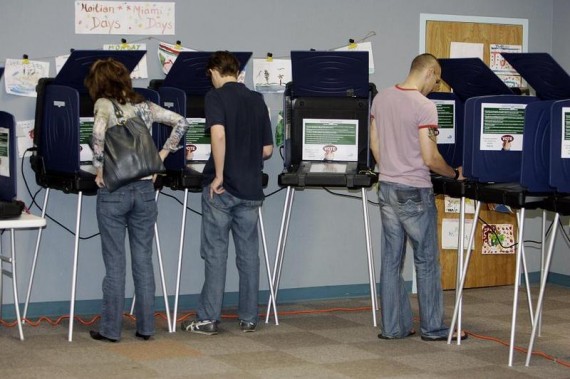Compulsory Voting: The Solution To All Of America’s Ills ?
There’s a proposal floating out there from a Brookings Institution scholar that suggests we consider making it mandatory for every American citizen to vote in every election:
William Galston thinks the key to less polarization in the electorate is compulsory voting. It’s the disaffected, the angry, who vote. The Howard Beales of the world. If everyone — including those in the less intense middle — voted, you would get fewer ideologues in office.
The Brookings Institution scholar is among those who are dismayed at the turnout in this country. Those in the wide middle of the spectrum are the ones who abstain from voting, and Galston thinks that’s not good. Get more people in the process by making it easier to vote through things like liberalized absentee voting.
It’s good for democracy, he says.
But there’s a catch to compulsory voting. You don’t vote, you pay a fine.
He is encouraged by the Australian system that that imposes a penalty — anywhere from $20 to $70 — on those who don’t vote.
In the study, Galston argues that bringing what he calls “less ideologically committed” voters to the polls would benefit the nation as a whole:
Near-universal voting raises the possibility that a bulge of casual voters, with little understanding of the issues and candidates, can muddy the waters by voting on non-substantive criteria, such as the order in which candidates’ names appear on the ballot. The inevitable presence of some such “donkey voters,” as they are called in Australia, does not appear to have badly marred the democratic process in that country.
Indeed, the civic benefits of higher turnouts appear to outweigh the “donkey” effect. Candidates for the Australian Parliament have gained an added incentive to appeal broadly beyond their partisan bases. One wonders whether members of Congress here in the United States, if subjected to wider suffrage, might also spend less time transfixed by symbolic issues that are primarily objects of partisan fascination, and more time coming to terms with the nation’s larger needs. At least campaigns continually tossing red meat to the party faithful might become a little less pervasive.
Honestly, I think Galston is being far too optimistic about the positive benefits of forcing people who don’t want to participate on Election Day to get to the polls or pay a fine.
For the most part, the non-voting population is made up of two broadly defined groups; the people who aren’t paying attention to the news and politics and don’t care about the election results, and the people who affirmatively choose not to participate in the election either for philosophical reasons, or because they don’t want to vote for any of the candidates on the ballot.
As to the first group, I’m not at all certain how the nation as a whole will benefit by giving electoral power to people who choose not to exercise it and don’t bother to educate themselves about the issues involved.
As to the second, forcing someone to cast a ballot when they affirmatively choose not to, or to cast a vote for someone they don’t want to vote for would seem to me to be a fairly clear violation of the First Amendment. Even adopting the Australian practice of allowing voters to cast a blank ballot seems insufficient, especially considering that Australia does not have the same Constitutional protections of free speech that we have in the United States.
Galston seems to think that forcing every American citizen to vote will somehow create a political consensus that will allow us to find solutions to the fiscal and structural problems that exist in Washington. Like most utopian solutions, though, it’s likely to create more problems than it solves.
H/T: Jason Pye







I kind of like the idea… with a couple caveats.
First, every ballot measure must have an “Abstain” option, that allows people to cast a ballot with no effect.
Second, every ballot measure where a person is seeking an office must have a “None of the Above” option. If “None of the Above” wins a majority of the vote, then a new election would be required, and the people who were on the previous ballot would be legally forbidden from running again during the new election.
How is that for a great way to clean out incumbents?
Hmm, nope… seriously. Voting is mandatory in Belgium and look at the results. If people with no interest in voting or in politics are forced to vote, they will vote blank or random to avoid paying the fine. Or even worse: pick a party based on the name without checking the party platform.
Is participation inadequate or have we extended the franchise too far?
And although I recognize I’m being silly and all 19th century but does the Congress have the power to compel people to vote? If making voting compulsory would require a constitutional amendment it might be fun to think about but kiss it goodbye.
Congress ? I would say no
Individual states ? Another question but I think the First Amendment would be an obstacle
Ah, more “positive action” legal compulsion at the individual level. You know what? I think it’s a great idea. The only way the public has a chance of catching on with this “do what the government tells you in every minute aspect of your life” legislation is if we roll it in nice and slow, say by forcing people to buy medical insurance or–in this brilliant case–forcing people to vote.
Once we can be forced into particular modes of education, employment and consumership as the state sees fit, utopia is upon us!
Apologies in advance for uncalibrating all of your sarcasm detectors.
but does the Congress have the power to compel people to vote?
Of course they do, it’s called the Commerce Clause.
Why should you be able to vote if you do not pay taxes?
This is why we need to return to the original intent of the founding fathers! If we stuck to the constitution:
-Businesses could keep the riffraff out because they would only serve who they wanted to.
-Senators would once again serve the hardworking people of the state, and wouldn’t be beholden to political interests.
-And white landowning males would control the country again. Only those with a stake OF the country should have a stake in RUNNING the country!
My much less expensive counter proposal: allow only one person to vote.
You pick this person at random using social security numbers.
None of the parties would have any idea who’d be voting or what that person might be like, what his or her interests might be. There would be no pandering on issues. Instead parties could focus on coming up with cool names, attractive logos, friendly color schemes and attractive spokesmodels.
We’d have the Warm Apple Pie Party with Oprah as its spokesman, versus the Tall, Cold Beer Party with Ashton Kutcher and Giselle.
Vote Pie!
Vote Beer!
I would support michael’s idea if it also included a ritual stoning of the chosen voter, who will obviously choose incorrectly in this fallen world. Preferably in time to ensure a good harvest.
The Brookings Institution can keep it’s loony ideas while citizens keep their freedom to do as they please. Is every solution to a problem some sort of compulsory action these days?
Did those morons even think before putting this out for consumption?
I’d rather they just make it easier to vote. Have Election Day be a federal holiday, and implement Same-Day Registration for voting.
How about if we make sure people only vote once, and that they are alive, and do it in person?
Why should you be able to vote if you do not pay taxes?
was up with the bq?
PD:
Hey, a good harvest is worth a life.
I live in Brazil, that has compulsory voting: the result is that most elections are decided by a very volatile population that does not want to vote and then choose candidates over futile reasons. It´s easy to find celebrities elected to Congress. In São Paulo, the largest state, in one election the most voted congressman was a closeted fascist(A guy that idolized Lyndon LaRouche) that became famous for yelling at his ads on the TV, while in the next election the most voted guy was a openly homosexual guy that speaked the most absurd things(Even to the point of calling his female coleagues ugly). And candidates knows that they doesn´t have to talk about public policies to win.
And worse, since most candidates knows that they don´t have to attract voters to the polls they simple ignore all the voters when they are ellected. And yes, the voting machines have a very visible “Blank vote” buttom.
What about the idea put forward by Robert Heinlein in “Starship Troopers”. In the world of “Starship Troopers”, to have full citizenship, including voting rights, you must first volunteer to serve a couple years, either in the military or in some other form of government service. Everyone has the right to serve, no matter their age or health, but no one is forced to. Also, those who make a career of military or government service cannot vote until after they resign or retire. Heinlein’s idea was that those who look beyond themselves and serve their country/society make better citizens and more responsible voters.
The problem with Heinlein’s idea is just like all the others put forth – it places over the voting public a template of the “preferred” voter or citizen. In his case, service to others is what indicates a “responsible” voter. To Rand, it would certainly be the highly individualistic who were most responsible. The list is truly limited only by the number of people with ideas. For my part, I think the most “responsible” voter is an educated one. It will never happen in this country, but I would love to see some sort of standard “government competence” test that would validate a vote. Don’t know jack about your current representatives in Congress? Don’t bother voting in this one.